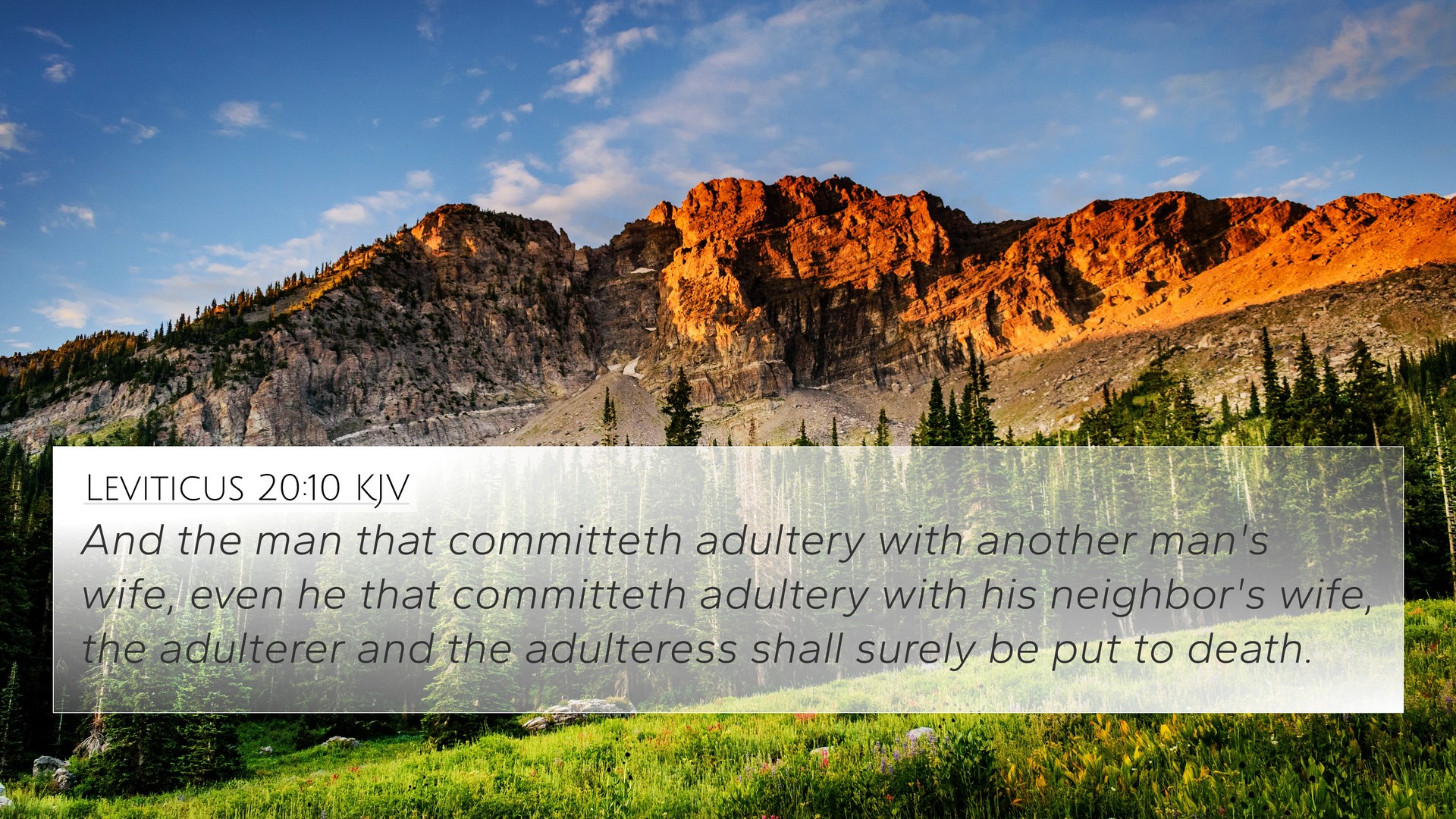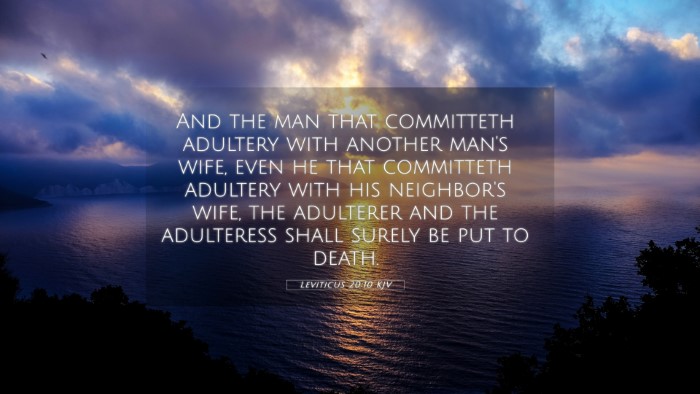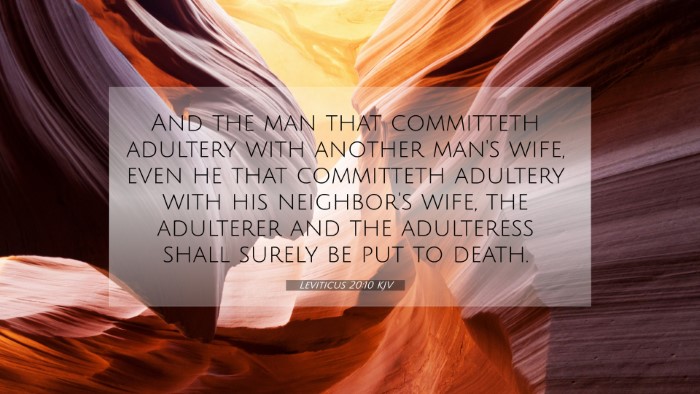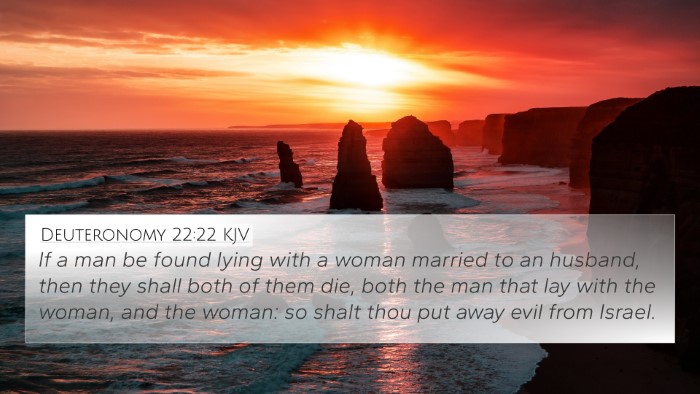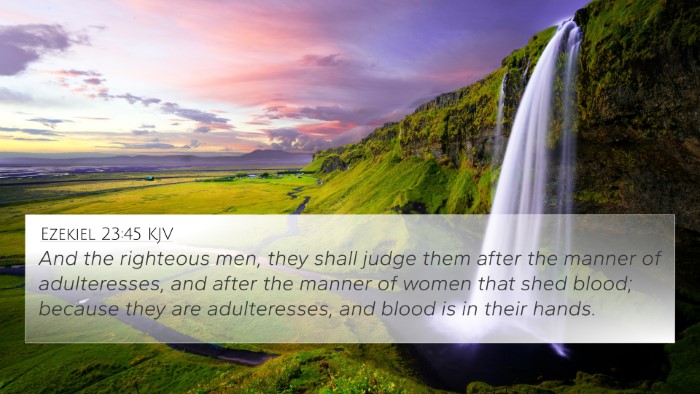Understanding Leviticus 20:10
Leviticus 20:10 states: "And the man that committeth adultery with another man's wife, even he that committeth adultery with his neighbour's wife, the adulterer and the adulteress shall surely be put to death."
This verse addresses the serious offense of adultery, emphasizing the sanctity of marriage and the consequences of violating that sacred bond. The weight of this law reflects the cultural and spiritual values of ancient Israel and frames the moral expectations of relationships.
Summary of Insights from Public Domain Commentaries
Below, we explore insights based on commentary from Matthew Henry, Albert Barnes, and Adam Clarke, providing a thorough understanding of this significant scriptural passage.
1. Matthew Henry's Commentary
Matthew Henry emphasizes the gravity of marital fidelity in God's eyes, highlighting that the commandment against adultery not only protects the sanctity of marriage but also the social order. He notes the severe consequences outlined for both parties involved in this sin, which serves as a deterrent against infidelity.
2. Albert Barnes' Commentary
Albert Barnes points out that this law stems from a covenantal relationship between God and His people. He suggests that God's desire is for the community to live in holiness and purity, underscoring that adultery is not only a personal sin but one that disrupts the entire community.
3. Adam Clarke's Commentary
Adam Clarke correlates this law to God's overarching authority and righteous judgment. He reflects on the historical context, noting that such laws were meant to uphold moral standards and protect societal values in ancient Israel. Clarke encourages understanding this verse as part of a broader framework of divine law.
Cross References and Thematic Connections
This passage finds numerous connections throughout the Bible, illustrating God's consistent stance on adultery and marital purity. Here are some significant cross-references:
- Exodus 20:14 - "Thou shalt not commit adultery." This is one of the Ten Commandments and mirrors the moral expectation set forth in Leviticus.
- Proverbs 6:32 - "But whoso committeth adultery with a woman lacketh understanding: he that doeth it destroyeth his own soul." This verse warns of the spiritual and emotional consequences of adultery.
- Hebrews 13:4 - "Marriage is honorable in all, and the bed undefiled: but whoremongers and adulterers God will judge." This New Testament passage reinforces the sanctity of marriage.
- Matthew 5:27-28 - "Ye have heard that it was said of old time, Thou shalt not commit adultery: But I say unto you, That whosoever looketh on a woman to lust after her hath committed adultery with her already in his heart." Jesus expands the definition of adultery to include lustful thoughts.
- 1 Corinthians 6:18 - "Flee fornication. Every sin that a man doeth is without the body; but he that committeth fornication sinneth against his own body." This verse emphasizes the damaging effects of sexual sin.
- James 4:4 - "Ye adulterers and adulteresses, know ye not that the friendship of the world is enmity with God?" This verse highlights the spiritual implications of unfaithfulness, both in marriage and in our relationship with God.
- Malachi 2:16 - "For the LORD, the God of Israel, saith that he hateth putting away: for one covereth violence with his garment, saith the LORD of hosts: therefore take heed to your spirit, that ye deal not treacherously." God's disapproval of divorce is linked to the sanctity of marriage responsibilities.
- Ephesians 5:25-27 - "Husbands, love your wives, even as Christ also loved the church, and gave himself for it; that he might sanctify and cleanse it with the washing of water by the word." This emphasizes the profound commitment expected in marital relationships.
- Romans 7:2-3 - "For the woman which hath an husband is bound by the law to her husband so long as he liveth; but if the husband be dead, she is loosed from the law of her husband." This highlights the permanence of marriage until death.
Thematic Analysis
The theme of marital fidelity is critical throughout both the Old and New Testaments. The connections between these verses create a comprehensive understanding of God's expectations concerning marriage. Inter-Biblical dialogue on this theme reinforces the notion that adultery is not merely a physical act but a failure to uphold spiritual commitments.
Tools for Bible Cross-Referencing
To deepen one’s understanding of Leviticus 20:10 and its related scriptures, utilizing tools such as a Bible concordance or a Bible cross-reference guide can be especially beneficial. These resources help explore the Bible verses that relate to each other, revealing the intricate web of scriptural relationships.
How to Use Bible Cross-References
Learning how to effectively use Bible cross-references can greatly enhance one’s study and comprehension of scripture. It involves identifying key terms within a verse, then finding related verses that expand upon or echo those themes. This method allows for a comparative Bible verse analysis that reveals both historical contexts and timeless truths.
Conclusion
Leviticus 20:10 serves as a strong reminder of the importance that God places on marital fidelity. The collective insights from various commentaries coupled with the cross-referenced scriptures provide a holistic understanding of the implications of this verse. Throughout scripture, the severe consequences of adultery reinforce both personal accountability and the necessity of maintaining the sacred bond of marriage.
